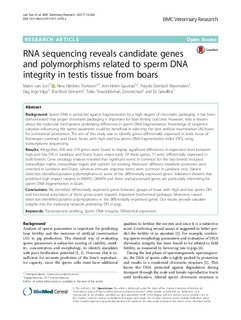RNA sequencing reveals candidate genes and polymorphisms related to sperm DNA integrity in testis tissue from boars
van Son, Maren; Tremoen, Nina Hårdnes; Gaustad, Ann Helen; Myromslien, Frøydis Deinboll; Våge, Dag Inge; Stenseth, Else-Berit; Zeremichael, Teklu Tewolderbrhan; Grindflek, Eli
Journal article, Peer reviewed
Published version
Permanent lenke
http://hdl.handle.net/11250/2485310Utgivelsesdato
2017Metadata
Vis full innførselSamlinger
Sammendrag
Background: Sperm DNA is protected against fragmentation by a high degree of chromatin packaging. It has been demonstrated that proper chromatin packaging is important for boar fertility outcome. However, little is known about the molecular mechanisms underlying differences in sperm DNA fragmentation. Knowledge of sequence variation influencing this sperm parameter could be beneficial in selecting the best artificial insemination (AI) boars for commercial production. The aim of this study was to identify genes differentially expressed in testis tissue of Norwegian Landrace and Duroc boars, with high and low sperm DNA fragmentation index (DFI), using transcriptome sequencing.
Results: Altogether, 308 and 374 genes were found to display significant differences in expression level between high and low DFI in Landrace and Duroc boars, respectively. Of these genes, 71 were differentially expressed in both breeds. Gene ontology analysis revealed that significant terms in common for the two breeds included extracellular matrix, extracellular region and calcium ion binding. Moreover, different metabolic processes were enriched in Landrace and Duroc, whereas immune response terms were common in Landrace only. Variant detection identified putative polymorphisms in some of the differentially expressed genes. Validation showed that predicted high impact variants in RAMP2, GIMAP6 and three uncharacterized genes are particularly interesting for sperm DNA fragmentation in boars.
Conclusions: We identified differentially expressed genes between groups of boars with high and low sperm DFI, and functional annotation of these genes point towards important biochemical pathways. Moreover, variant detection identified putative polymorphisms in the differentially expressed genes. Our results provide valuable insights into the molecular network underlying DFI in pigs.
Beskrivelse
© The Author(s). 2017 Open Access This article is distributed under the terms of the Creative Commons Attribution 4.0 International License (http://creativecommons.org/licenses/by/4.0/), which permits unrestricted use, distribution, and reproduction in any medium, provided you give appropriate credit to the original author(s) and the source, provide a link to the Creative Commons license, and indicate if changes were made. The Creative Commons Public Domain Dedication waiver (http://creativecommons.org/publicdomain/zero/1.0/) applies to the data made available in this article, unless otherwise stated.

